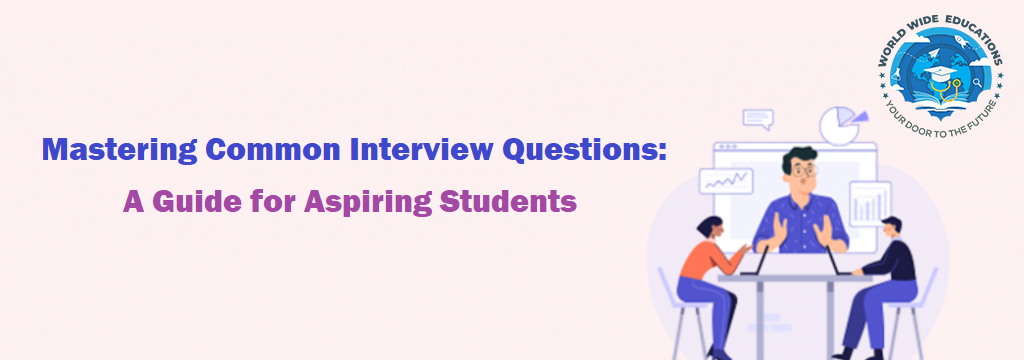Introduction
Interviews can be a nerve-wracking part of the college or job application process. However, with adequate preparation, you can turn this challenge into an opportunity to shine. Practicing common interview questions is one of the most effective ways to boost your confidence and improve your performance. This guide will help you understand the importance of interview preparation, provide you with common interview questions, and offer tips on how to craft impressive responses.
Why Practice Common Interview Questions?
- Build Confidence: Familiarizing yourself with common questions helps reduce anxiety and build self-assurance.
- Improve Articulation: Practicing allows you to refine your answers and articulate your thoughts clearly and concisely.
- Highlight Strengths: It enables you to strategically emphasize your skills, experiences, and achievements.
- Handle Curveballs: Preparation equips you to handle unexpected questions more effectively by improving your overall comfort level.
Common Interview Questions and How to Answer Them
1. Tell Me About Yourself.
This question is often used as an icebreaker. It’s your chance to make a strong first impression.
Tips for Answering:
- Be Concise: Keep your response focused and relevant to the position or program you are applying for.
- Highlight Key Points: Briefly mention your background, major achievements, and why you are interested in the institution or role.
- Practice a Script: Prepare a short script but be natural in your delivery.
Example Answer: "I am a recent high school graduate with a strong passion for environmental science. I have always been fascinated by the interplay between human activities and the environment, which led me to spearhead a recycling initiative at my school. This experience, along with my academic achievements in biology and chemistry, has motivated me to pursue a degree in Environmental Science at your esteemed university."
2. Why Do You Want to Attend This Institution?
This question assesses your knowledge about the institution and your motivations for applying.
Tips for Answering:
- Be Specific: Mention specific programs, faculty, facilities, or aspects of the campus culture that attract you.
- Show Enthusiasm: Convey genuine interest and enthusiasm for the institution.
- Align with Your Goals: Explain how the institution’s offerings align with your academic and career goals.
Example Answer: "I am particularly drawn to your university because of its renowned Environmental Science program and the opportunity to work with Professor Smith, whose research on climate change I admire. The state-of-the-art laboratory facilities and the strong emphasis on interdisciplinary learning will provide me with the skills and knowledge necessary to pursue my goal of becoming an environmental policy analyst."
3. What Are Your Strengths and Weaknesses?
This question evaluates your self-awareness and honesty.
Tips for Answering:
- Strengths: Choose strengths that are relevant to the program or role and provide examples.
- Weaknesses: Select a genuine weakness and discuss how you are working to improve it.
- Balance: Ensure your answer demonstrates self-improvement and a proactive attitude.
Example Answer: "One of my strengths is my ability to work collaboratively. During a group project in my biology class, I took the initiative to organize our tasks and ensure everyone’s ideas were heard, which led to a successful presentation. As for my weakness, I sometimes struggle with public speaking. To overcome this, I joined the debate club to practice speaking in front of an audience and gain more confidence."
4. Describe a Challenge You Have Faced and How You Overcame It.
This question assesses your problem-solving skills and resilience.
Tips for Answering:
- Be Honest: Choose a real challenge you have faced.
- Structure Your Answer: Explain the situation, the actions you took, and the outcome.
- Highlight Skills: Emphasize the skills you used or developed to overcome the challenge.
Example Answer: "During my junior year, I faced the challenge of balancing my academics with a part-time job. To manage my time effectively, I created a detailed schedule prioritizing my tasks. I also communicated with my teachers and employer to set realistic expectations. This experience taught me valuable time management skills and the importance of seeking support when needed. Despite the hectic schedule, I maintained a high GPA and received positive feedback at work."
5. Where Do You See Yourself in Five Years?
This question aims to understand your long-term goals and how the institution or role fits into them.
Tips for Answering:
- Be Realistic: Set realistic and achievable goals.
- Show Ambition: Demonstrate your ambition and how the institution or role will help you achieve your goals.
- Connect to the Institution: Explain how the institution’s resources or opportunities will support your career path.
Example Answer: "In five years, I see myself having graduated with a degree in Environmental Science and working as an environmental consultant. I am eager to apply the knowledge and skills gained from your program to help businesses develop sustainable practices. The hands-on research opportunities and industry connections your university offers will be instrumental in achieving this goal."
6. Why Should We Choose You?
This question is your opportunity to stand out and make a compelling case for your candidacy.
Tips for Answering:
- Summarize Your Strengths: Highlight your most relevant strengths and achievements.
- Match with Requirements: Connect your skills and experiences to the institution’s or role’s requirements.
- Show Passion: Demonstrate your passion and commitment.
Example Answer: "You should choose me because of my strong academic background, my commitment to environmental sustainability, and my proven ability to lead and collaborate effectively. My experience with the recycling initiative at my school showcases my leadership skills and dedication to environmental causes. I am confident that my passion for the environment and my academic achievements will allow me to contribute meaningfully to your university community."
7. Do You Have Any Questions for Us?
This question is usually asked at the end of the interview and assesses your interest in the institution or role.
Tips for Answering:
- Prepare Questions: Have a few thoughtful questions ready.
- Show Curiosity: Ask questions that demonstrate your interest and enthusiasm.
- Focus on Opportunities: Inquire about opportunities for growth, development, and involvement.
Example Questions:
- "Can you tell me more about the research opportunities available to undergraduate students in the Environmental Science program?"
- "How does the university support students in finding internships and job placements after graduation?"
- "What kind of extracurricular activities and organizations are available for students interested in environmental sustainability?"
Additional Tips for Practicing Interview Questions
1. Conduct Mock Interviews
Simulate the interview experience by conducting mock interviews with friends, family, or mentors. This practice can help you get comfortable with the format and receive constructive feedback.
2. Record Yourself
Record yourself answering common interview questions. Reviewing the recordings can help you identify areas for improvement, such as body language, tone, and clarity of responses.
3. Use the STAR Method
For behavioral questions, use the STAR method (Situation, Task, Action, Result) to structure your answers. This approach helps you provide clear and concise responses.
Example Using STAR Method:
- Situation: "During my senior year, our school was facing a waste management issue."
- Task: "As the head of the environmental club, I was tasked with finding a solution."
- Action: "I organized a team to conduct a waste audit and implement a recycling program."
- Result: "Within three months, we reduced waste by 30% and increased recycling by 50%."
4. Be Authentic
While it’s important to practice, ensure that your responses remain authentic and genuine. Avoid memorizing answers verbatim; instead, focus on conveying your true personality and experiences.
5. Research the Institution or Company
Tailor your answers to align with the values, culture, and specific requirements of the institution or company you are interviewing with. This demonstrates your genuine interest and preparedness.
Conclusion
Practicing common interview questions is an essential part of preparing for any interview, whether for college admissions or job applications. By familiarizing yourself with these questions, refining your answers, and building your confidence, you can make a lasting impression and significantly increase your chances of success. Remember to be authentic, articulate, and enthusiastic, and you will be well on your way to acing your interview.


